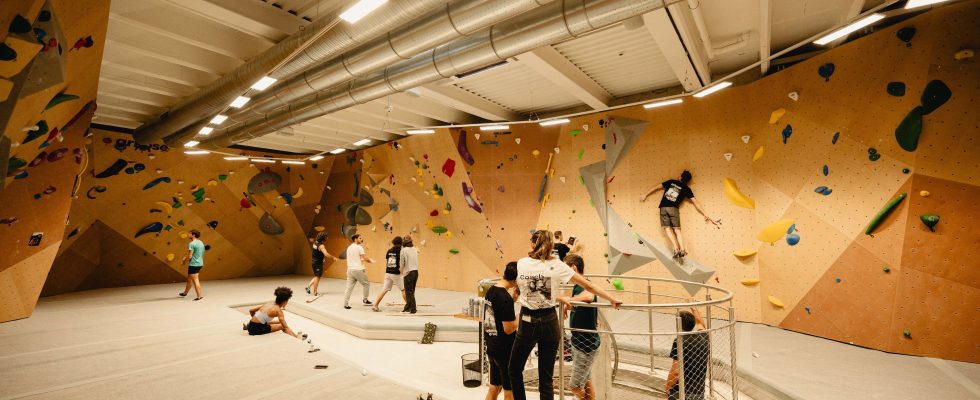Between the fake bars and the vintage fashion boutiques of the Strasbourg Saint-Denis district, in Paris, it is in an old garage that Arkose found its new setting. After more than a year of work and 3.8 million euros invested, the group is preparing to open its tenth climbing gym in Ile-de-France. In the heart of this district popular with young executives, the founders continue their conquest of the – for the moment inexhaustible – pool of urban workers attracted by bouldering: climbing without a rope, on volumes 3 to 5 meters high.
This type of climbing, which allows you to free yourself from route climbing requiring mastery of the rope and belaying, is exploding in Paris and in large cities. Rooms are springing up on every street corner, close to newbies. “Finding one near your home has made it possible to democratize climbing, and bouldering, which is easy to access, encourages rapid progression which is very appealing,” explains Grégoire de Belmont, a former engineer with Renault. and founder of Arkose – a rock from the sandstone family – in 2013 with three partners.
The pioneers, Antrebloc or Block’Out, had paved the way in the 1990s, with their artificial climbing rooms. But Arkose has been able to take the marketing turn that the sector has so far lacked. Surfing on the promising theme of outdoor sports, the company stands out for its well-crafted communication around the preservation of the environment, the return to nature – even under the asphalt – and conviviality. In its brand new spot in the 10th arrondissement, the furniture is mismatched – the furniture is “vintage”, we explain -, the canteen labeled “eco-friendly” gives pride of place to veggie burgers and other kale tempuras, and the beers, of artisanal manufacture, are concocted just a stone’s throw away. Bio, short circuit, recycling… All the sore lights are green. Until the designation of the rooms, renamed “climbing lofts”.
Travel agency, a new outlet
Present in Brussels, Madrid, Lille, Toulouse and Marseille, the SME, which employs some 500 employees, has made greater Paris its preferred territory. Even if it means going beyond its core target by buying route rooms, to cover the full range of climbing. In 2018, it offered the two large installations of MurMur in Pantin and Issy-les-Moulineaux, a historic player popular with experienced practitioners. “We were on the fence but Arkose upped the ante,” recalls François Petit, the boss of Lyon rival Climb Up, whose development is more focused on very large venues on the outskirts of cities.
Diversification also involves new activities, related to indoor climbing. After the brasserie, the restaurants and the brand of equipment, it is now up to the travel agency, Arkose Escapade. The goal ? Take the béotians to exceptional sites, in France and in Europe. Provençal coves, Verdon gorges, cliffs of Catalonia or rocks of Fontainebleau, the stays are built on the same triptych: beautiful places, good cuisine and respect for the place. Far from UCPA stays in dormitories, the prices are to match: 1,500 euros per week in Sardinia, fed and housed on an agrotourism farm. “It’s a microbusiness, admits Grégoire de Belmont, but a very big vector of image and loyalty.” If the Covid has pushed the accounts into the red and weighed down a turnover – 19 million euros in 2019 – which until then doubled each year, the house, in full development since the end of the pandemic, aims to balance in 2023.
Room for everyone?
Competition, inevitably, is becoming more pressing. “In the Paris area, we went from 10 to 20 rooms in a few years,” notes François Petit. In addition to Climb Up and Arkose, fans of the capital can also sweat at Vertical’Art or Climbing District, which will open new intramural spots this fall. “For the moment, the discipline is expanding: we are not gaining customers,” assures Antoine Paulhac, the co-founder of Climbing District. A cordial, but precarious, understanding: members, like trees, do not climb to the sky. Even with practice.
